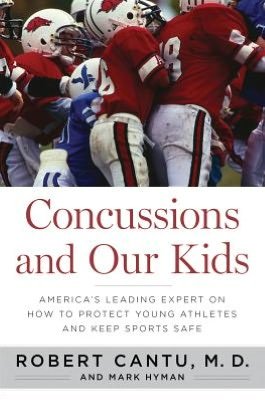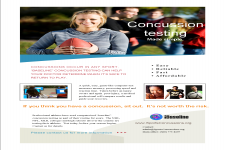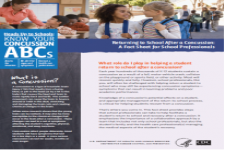Treaments for concussion-related headaches - Dr. William Meehan
- Created on Thursday, 24 March 2011 17:16
- Last Updated on 08.11.2012
- Published Date
Headache is the most common symptom of concussion in general and of sport-related concussion specifically. Often, headaches will resolve within the first few days to weeks after a sport-related concussion with only physical and cognitive rest. But for some athletes, headaches will persist. Ironically, those who seem, at first, to have sustained only a minor injury, often suffer worse headaches afterward, and suffer headaches for a longer period of time, than those who initially seemed to have a more severe injury.
Obtaining physical and cognitive rest will help alleviate headaches caused by concussion. Avoiding prolonged periods of concentration, thinking and reasoning can help prevent headaches. Therefore, much like the recommendations provided (here) for athletes in school, all athletes should try to break up cognitive tasks that they cannot avoid into many small chunks of time, as opposed to focusing on a given cognitive task for one long stretch of time.
In response to post-concussive headaches, many athletes will start taking common over-the-counter medications such as acetaminophen, ibuprofen, and aspirin. Certainly, these medications are useful in treating headaches in general. They are safe and well-tolerated by most patients. However, they should not be taken routinely to treat the headaches of a sport-related concussion. They tend to be ineffective in treating post-concussive headaches. Oftentimes, athletes take these medications three of four times per day in an attempt to alleviate the headaches. Once an athlete has been taking these medications multiple times per day for several days or weeks, it can be hard to stop them. Any attempt to stop the medications will result in “rebound headaches”...Athletes will often mistake these rebound headaches for persistent post-concussive headaches. This makes it difficult to determine when the athlete has recovered.
If headaches persist and are negatively impacting an athlete’s quality of life, there are multiple other strategies and medications that can be used to treat the headaches related to a concussion. Oftentimes, at the Sports Concussion Clinic at Children’s Hospital Boston, we will offer the athlete a medicine called amitriptyline. Amitryptyline is most commonly used as an antidepressant, or a medication given to patients suffering from clinical depression. However, is also effective at treating headaches: migraine headaches, tension headaches, cluster headaches, and post-concussive headaches.
Therapies such as biofeedback, psychotherapy, physical therapy, and trigger point injections can be used to treat post-concussive headaches, either by themselves or in conjunction with medications.
Editor’s note: For more information contact your health care provider.
(1) Meehan, William P. Kids, Sports, and Concussion: a Guide for Coaches and Parents. Santa Barbara, CA: Praeger, 2011. Print.
 Dr. William Meehan, III, is director of the Sports Concussion Clinic in the Division of Sports Medicine at Children's Hospital Boston, MA, and instructor of pediatrics and orthopedics at Harvard Medical School, Boston, MA. He holds grants from the National Institutes of Health, the National Football League, and the Center for the Integration of Medicine and Innovative Technology, which allow him to conduct both clinical and scientific research on concussive brain injury.
Dr. William Meehan, III, is director of the Sports Concussion Clinic in the Division of Sports Medicine at Children's Hospital Boston, MA, and instructor of pediatrics and orthopedics at Harvard Medical School, Boston, MA. He holds grants from the National Institutes of Health, the National Football League, and the Center for the Integration of Medicine and Innovative Technology, which allow him to conduct both clinical and scientific research on concussive brain injury.
Brain Health
Children and young adults scanned multiple times by computed tomography (CT), a commonly used diagnostic tool, have a small increased risk of leukemia and brain tumors in the decade following their ...
read more...-
Why concussions affect people differently
Bronx, NY — Patients vary widely in their response to concussion, but scientists haven’t unde...
-
Teens miss recovery clues after concussion
PITTSBURGH — When recovering from concussion, young athletes rely too much on how they f...
-
Discovering the roots of migraine
Common questions encountered during the post-concussion exam are often migraine-related. Do you...




Neuroscience
NFL Hall of Famer "Iron Mike" Webster's life ended in 2002 when he suffered a heart attack at age 50. Four Super Bowl rings, nine Pro Bowls, and voted to the NFL's all-time team in 2000, the driven, ...
read more...-
Progesterone seems to protect neurons after injury
It is not yet known why girls suffer concussions at a higher rate than boys. The most prevalent...
-
911 signal relay sends help to brain injury
Like emergency workers rushing to a disaster scene, cells called microglia spe...
-
GPS for the brain; the "connectome"
Athens, Ga.- University of Georgia researchers have developed a map of the human brain that shows...
Resources
- School professionals play an important role in the health of all students. Recognizing the signs and symptoms of concussion is important, as is managing their return to school post-injury.
- Some ...
- https://
- CDC's Concussion Training for Clinicians
-
Concussion Education Video Programs - ...
Parents, athletes, coaches and medical professionals have access to concussion education created...
-
New concussion guidelines for team ...
INDIANAPOLIS – Team physicians who assess and treat athletes suspected of concussion have new ...
The risk of concussions in young football players
Marjorie Albohm President, National Athletic Trainers' Association
quick links
Latest News
Concussions Occur...
...in Any Sport
REMOVE athlete from play
REFER to medical provider
REST no sports, no texting/TV
RETURN only with doctor's OK
Source: Children's Hospital Boston, Sports Concussion Clinic
































